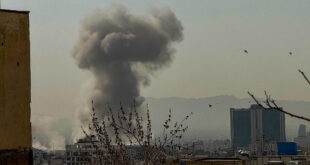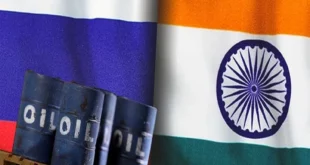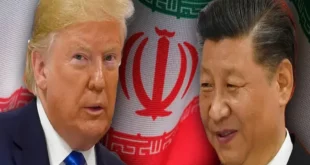U.S. President Donald Trump’s top Asia adviser on Friday urged the world’s democracies to call out China’s abuses and reject a campaign of global influence to co-opt nations into a mindset conducive to Beijing’s “grand ambitions.”
Speaking during a video conference hosted by Policy Exchange in London, Deputy National Security Adviser Matt Pottinger said that while Moscow and Tehran are seeking to sow global chaos through actions such as working to undermine the upcoming U.S. presidential election, “no regime has more riding on its ability to influence the perceptions, policies and priorities of foreign populations than the Chinese Communist Party (CCP).”
Pottinger pointed to the CCP’s “United Front Work,” which he said gathers intelligence about, and works to influence, foreign elites and the organizations they run—leaving diplomacy to the Chinese foreign ministry.
“The material is used … to influence and intimidate, reward and blackmail, flatter and humiliate, divide and conquer,” he said.
“The Party’s goal, in short, is to co-opt or bully people—and even nations—into a particular frame of mind that’s conducive to Beijing’s grand ambitions.”
Pottinger said that the CCP’s overseas propaganda works to assert that China is the future and that stakeholders should adjust accordingly, but also promotes the idea that China’s aspirations are shared by all and should not be feared.
He called the twin pillars of the strategy “the elaborate con at the heart of all Leninist movements.”
“When the con doesn’t induce acquiescence, the Party often resorts to intimidation and repression,” he said.
Pottinger said that pattern played out after demonstrations last year in Hong Kong, where millions of people took to the streets to protest efforts by Beijing to undermine the territory’s rule of law.
“So, Beijing resorted to Plan B. It demolished [former Chinese president] Deng Xiaoping’s ‘One Country, Two Systems’ framework and deprived Hong Kong of the autonomy that made it the most spectacular city in Asia.”
To counter the CCP’s campaign of influence, Pottinger said, Trump has employed a foreign policy of “reciprocity and candor,” responding in kind when a country injures U.S. interests and speaking honestly and publicly to all nations.
He warned nations not to fear confrontational rhetoric, which he said clever adversaries use against the U.S.
“By portraying truth-telling as an act of belligerence, autocrats try to badger democracies into silence—and often succeed,” he said.
‘No justification for concentration camps’
Pottinger called on the people of China to use the spirit of candor to “research the truth about your government’s policies toward the Uyghur people and other religious minorities,” up to 1.8 million of whom authorities are believed to have detained in a vast network of internment camps in the Xinjiang Uyghur Autonomous Region (XUAR) since early 2017.
Beginning in October 2018, China started acknowledging the existence of the camps after long denying it, but described them as voluntary “vocational centers” set up to combat radical Islamic terrorism.
RFA’s Uyghur Service has found that detainees are mostly held against their will and forced to endure inhumane treatment and political indoctrination.
A former marine who served in three tours of duty fighting in Iraq and Afghanistan, Pottinger said “I can tell you that what is taking place in Xinjiang bears no resemblance whatsoever to an ethical counter-terrorism strategy.”
He likened the abuses to those Chinese diplomat P.C. Chang (Peng Chun Chang) worked to prevent when he served on the original United Nations Commission on Human Rights and played an important role in its drafting of the Universal Declaration of Human Rights in 1948, a year before the Republic of China that Chang represented was overthrown by Mao Zedong’s communists.
“There is no credible justification I can find in Chinese philosophy, religion, or moral law for the concentration camps inside your borders,” he said.
Pottinger’s use of the term “concentration camps” to describe the facilities used as part of Beijing’s campaign of extralegal incarceration in the XUAR marks a significant uptick in the rhetoric U.S. officials have deployed as they seek to hold China accountable for its abuses in the region.
Last week, U.S. National Security Adviser Robert O’Brien said China is carrying out “something close to” a genocide with its treatment of Uyghurs and other Muslims in the XUAR. He also used the term “concentration camps” to describe detention facilities there.
“If not a genocide, something close to it is going on in Xinjiang,” O’Brien said during an online event hosted by the Aspen Institute, while also slamming China for its heavy-handed approach to Hong Kong.
While the U.S. has publicly admonished Beijing for its policies in the XUAR and imposed sanctions on Chinese officials deemed responsible for them, it has not used the term “genocide,” which would require that Washington take stronger action against China.
Earlier this week, Canada’s parliament adopted a resolution formally recognizing China’s abuses in the XUAR as “genocide” and urged the country’s government to follow suit and pursue sanctions against Chinese officials.
Xi jabs at US
Pottinger’s comments came on the same day that Chinese President Xi Jinping struck out at “unilateralism, protectionism, and extreme egoism” in a thinly veiled reference to the U.S. during comments he made to commemorate the 70th anniversary of China’s entry into the Korean War.
“In today’s world, the pursuit of unilateralism, protectionism and extreme egoism leads nowhere,” Xi said, according to China’s official Xinhua News Agency.
“Arrogance, always doing as one pleases, acts of hegemony, overbearance or bullying will lead nowhere.”
China sent troops to assist North Korea fight a U.S.-led U.N. coalition in the 1950-53 conflict it refers to as the “War to Resist U.S. Aggression and Aid Korea.” The fighting ended with an armistice, and North and South Korea technically remain at war, with China and the U.S. as their main allies.
Washington and Beijing have been embroiled in a tit-for-tat exchange over issues including trade, the handling of the coronavirus pandemic, the autonomy of Hong Kong, territorial claims in the South China Sea, and ethnic rights that has seen bilateral relations reach their lowest point in four decades.
 Eurasia Press & News
Eurasia Press & News



